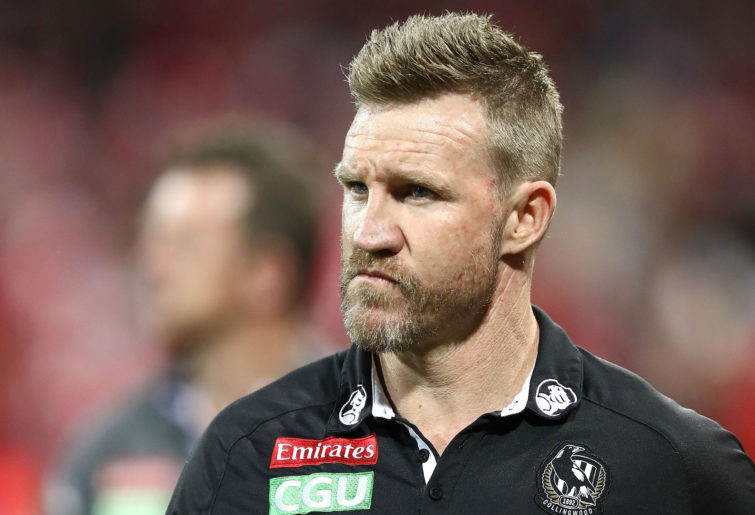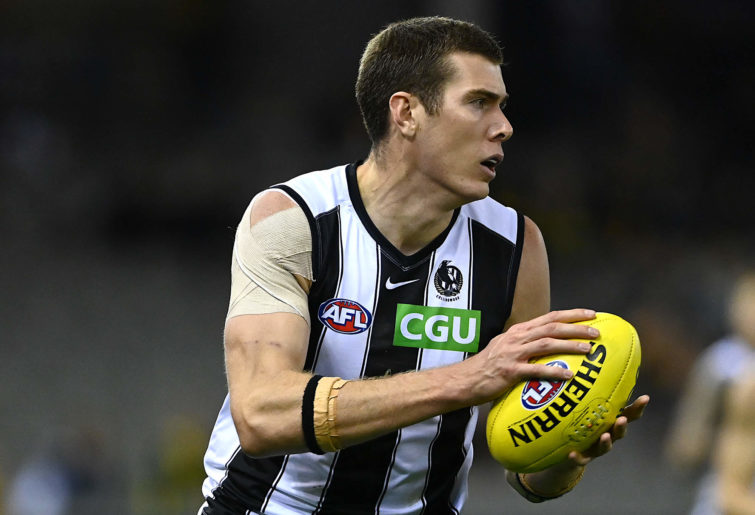On Friday night, I tuned into Collingwood’s season opener against the Western Bulldogs.
The Bulldogs kicked three quick goals early. Then the game turned into a tussle. Every time the Bulldogs had the ball in hand, they looked dangerous. Every time Collingwood had the ball, for the most part they plodded around the way they always do.
During one of the breaks, the commentators discussed the way Collingwood was playing. Jonathan Brown implored Collingwood to take the game on. Garry Lyon lamented Collingwood’s skills weren’t up to executing that strategy. The two went back and forth.
Lyon claimed Collingwood had tried to take the game on early just as Brown was suggesting, but the Bulldogs had smashed them, so Collingwood had reverted to their default defensive gameplan to lock the game down before it escaped them.
Really?
Because that’s not the game I saw.
See, I’ve watched Collingwood during Nathan Buckley’s tenure as coach.
Let’s remove 2018, which is proving an aberration in Collingwood’s brand – the one year that was the exception, while the other nine (and counting) established the rule. Statistically, this is the overwhelming evidence that lets us identify, dissect, and examine Collingwood’s methodology – or lack thereof.
In 2019, their system started to break down. They lost the fluency and daring from 2018. They over-possessed, moved indirectly and tried to control the game by not taking risks. They grew stagnant. As the opposition recognised this, they increased the pressure around the ball-caller, forcing turnovers.
Although Collingwood started brightly in 2020, the breakdown became more prevalent as the season wore on. The more Collingwood tried to control the game, the less threatening they became. And it’s all reminiscent of Collingwood circa 2014-2017.
That’s the model of Collingwood that’s now traipsing about. People have grown too attached to 2018 Collingwood, and what their best was able to offer. But that’s a long time gone now, and football can change quickly – especially for the worst. What we saw on Friday night was common during those four seasons they missed finals, and which we saw reemerging 2019 – 2020.
Collingwood would get jumped early, lift, apply pressure and often lose by the margin established in the first 15 minutes.
Yet somehow, Garry Lyon would have us believe that Collingwood is like an American football team that calls plays mid-contest.
We’re talking about the AFL, where clubs have a gameplan. And that’s it. They might modify it at times – drop a player back, play an extra at stoppages, try to control the tempo (especially when trying to slow opposition momentum) or flood defensively, but the gameplan itself remains largely unchanged.
How Lyon could profess that after the Bulldogs kicked the opening three goals, Nathan Buckley somehow got a message to all his charges at the six-minute mark and instructed them to totally change their style of play, and all the players immediately got on board, is staggering. It clearly bemused Jonathan Brown, too.

(Photo by Ryan Pierse/Getty Images)
By Lyon’s logic, any team who establishes a quick and early lead must only do so because their opponent is trialling a different gameplan.
The truth is much simpler.
The Dogs were great and jumped the Pies. There you go. That’s it. It happens in football.
If there’s any hideous statistical disparity between Collingwood early and Collingwood later, it’s because they couldn’t get their hands on the ball early (because the Dogs were too good), rather than because they were trying to play differently.
Once Collingwood acclimated to the pace of the game, once they started to get a feel for their match-ups and the Dogs’ attack, then that competitive gap narrowed – not a lot, but enough to give Collingwood a peek into the contest. Then we had the typical gallant Collingwood effort undone by poor ball movement and skill errors.
Something worse also reared its head – and which was reminiscent of 2017 for another reason: Collingwood’s lack of initiative.
In 2017, Nathan Buckley’s coaching future was heavily under speculation. That speculation strangled the players’ adventurousness. They played without daring and became gun-shy with the ball. They grew timid, like they were so worried that playing risky football would lead to mistakes and seal Buckley’s demise that they eliminated temerity as a facet of their game.
And here it all is again.
We can point to the occasional highlight, but as was often the case from 2014-2017 and 2019-2020, there is no genuine sustainability. It teases, then evaporates, and we’re left hoping that maybe, just maybe, there’ll come a point it’ll click for good.

(Photo by Quinn Rooney/Getty Images)
But, hey, we should know better by now.
On Friday night, Trey Ruscoe accumulated three possessions, debutant Oliver Henry four, Brayden Sier nine, and Josh Daicos nine (although it was a strange move to play Daicos as a defensive forward after his breakout 2020 as a winger). While much was made about how youth would rejuvenate Collingwood, and how players such as Sier would help fill the void left by the departees, it shows that inexperienced players will struggle in a side without that framework of experience around them, and which plays without a purposeful system.
As much as football is about defence, it’s also about attack. You need to kick goals. While zones and tackling and unrelenting pressure might limit the score an opposition will kick, it’s all for nothing if offensively there aren’t strategies that can either slice through an opponent’s defences, or cause such havoc that they create opportunities.
An opposition defence is hardly concerned by a team who moves the ball so slowly, they can get every single player back into the required defensive zone, or multi-team a key target, or create such congestion that it’s impossible to create crumbing opportunities.
The 2018 preliminary final was the epoch of this list build and the coaching brains trust. Whatever the club planned for the immediate future following their grand final defeat, surely it wasn’t this: an ongoing breakdown whirlpooling the club back into oblivion.
If we can strip away the hard sell that things will turn around quickly (given this list’s age and experience profile), if we can dismiss the excuses (a fellow Collingwood supporter blamed umpires – sigh), if we can be honest with ourselves about where the club stands, we should admit this still isn’t working for Collingwood.
If last year’s trade debacle and Eddie McGuire’s demise as president weren’t clear enough clues, then this season is likely to show just how broken Collingwood has become.






























































































